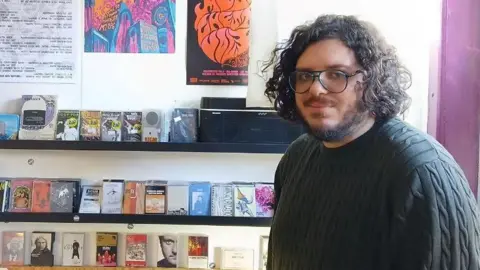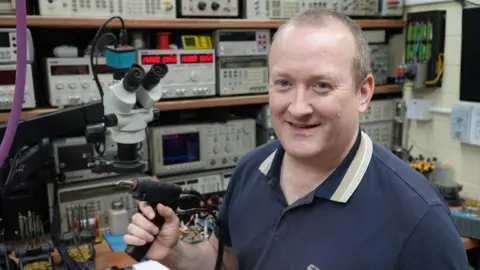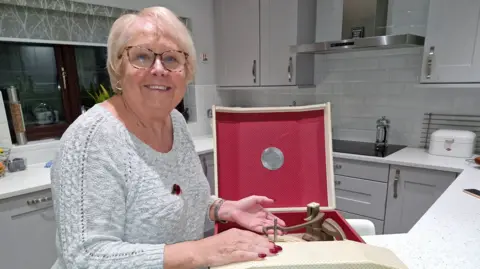 Alex Tadros
Alex TadrosMars Tapes in Manchester is the last store in the UK to sell only cassette music, says Alex Tadross, one of the owners.
Business was booming: "When the Oasis tour was announced, we pretty much sold out of everything at Oasis. Everything was flying out," he said.
Tapes of music from the 1980s are also popular, especially by Kate Bush, which Mr. Tadros said may be because her music appears in the hit Netflix series "Stranger Things."
“Our customers are diverse,” he said. "A lot of them were in their 20s and teenagers who first came into contact with it, and then there are people in their 40s and 50s who owned tapes and bought them for nostalgia purposes.
"But most are under 30. We have a lot of teenagers coming with their parents."
The store's own-brand cassette recorders are also popular.
I have people coming to me to buy their first tape recorder,” Mr. Tadros said.
 Getty Images
Getty ImagesThe boom in business at Mars Tapes is part of a broader trend of people buying and repairing old music equipment.
Google searches for "CD player repair near me" grew by 23% between 2020 and 2024, while "audio equipment repair near me" grew by 91%, according to trend data provided by software company SEMRush.
Report by Statista The global electronics repair services market is forecast to grow from US$122 billion (£96 billion) in 2021 to US$240 billion (£190 billion) in 2033.
So why are some music lovers looking for alternatives to digital music services?
Perhaps modern Bluetooth speakers, earbuds, and headphones lack the features of older devices.
“The market is flooded with devices that are cheap and convenient but provide an impersonal, boring experience,” said Sarah Dodge, strategic design manager at the Ellen MacArthur Foundation.
"When you repair an item, you become more attached to it, so people may be drawn to a more empowering and valuable ownership experience."
For Mark Maher, repairing electrical equipment was a hobby, but soaring demand led him to quit his job as a manager at a multinational power transmission equipment company in September to focus on it full-time.
In fact, demand has "become so out of control" that Mr Maher has closed the contact section on his website.
"The trend of repairing vintage audio equipment is definitely growing," said Mr Maher, of Perton Electronics in the West Midlands.
"People want to restore all kinds of things, like the Sony Walkmans, tape recorders and portable CD players they had and loved as teenagers. There's a lot of nostalgia there."
He said people are restoring old audio equipment they bought on platforms like Ebay. “The equipment back then was certainly better and easier to repair than the latest equipment.”
He thinks he's also popular because "there's a real shortage of people who can fix things," he said.
Mr. Maher also runs a YouTube channel, Mend it Mark, which has nearly 100,000 subscribers.
 Mark Maher
Mark MaherRefurbished tech marketplace Back Market said its audio equipment category has grown an average of 123% year-on-year since launching on the platform in 2016.
The company says record players are the best-selling product in retro audio technology.
At the Fixing Factory, a repair center in Camden, London, innovation and development manager Dermot Jones says audio equipment makes up a large proportion of the products the organization repairs.
“We have a little bit of everything,” Mr. Jones said. "Old cassettes, CD players, headphones, speakers, and turntables. The advantage of old gear is that they last longer (longer), you can find the specs, and there are many service manuals up to the 1980s.
With some audio equipment you can even open the case and there's a diagram inside (what the inside looks like) and even arrows pointing to the screws; they're very well designed. "
Today's electrical equipment looks "designed to break," he said.
Mr Jones added: "It was almost never designed to be opened and fixed; it was designed and put together so quickly that no one thought it would break. The manufacturer holds on to this knowledge rather than sharing it with our repair staff It would be easier to fix things (if they did)."
Ms Dodge said the restoration operation supported the shift to a circular economy, a system where materials are never wasted and nature is regenerated.
"One of the principles of the circular economy is to keep products at their highest utility and value for as long as possible. The idea is that if you send a product like a CD player to landfill, it becomes waste.
"Even if you recycle it and restore it to its material level, you're stripping away all the energy that went into converting those materials into a CD player in the first place."
 Mark Hammond
Mark HammondBringing old music equipment back to life can bring back special memories.
Last Christmas Eve, Mike Hammond was inspired to prepare a memorable gift for his wife of more than 50 years.
Gathering dust in the attic is a record player that his wife, Ellen, received from her parents in 1960 when she was 10 years old. The problem is that it's broken.
"I would never throw it away," said Mr Hammond, who lives in Sesden, near Wolverhampton. “There’s so much history (associated with it).”
He found Mr. Maher, who fixed it in time for Christmas.
On Christmas Day, Mr. Hammond asked Ellen to go into the utility room, where she found the record player playing one of their favorite records, The Beatles' "A Hard Day's Night."
He told me that Allen's reaction was worth it.
"There were tears," Allen said. "It was really touching. Some of my cousins came and said, 'Oh my gosh, we remember coming to your house and seeing that record player'."
